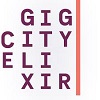
PART 2: “Gig City Elixir” to close this year’s “Startup Week Chattanooga” in a big way
 (EDITOR’S NOTE: This is the final article in a two-part series spotlighting the upcoming “Startup Week Chattanooga” later this month.)
(EDITOR’S NOTE: This is the final article in a two-part series spotlighting the upcoming “Startup Week Chattanooga” later this month.)
By Tom Ballard, Chief Alliance Officer, PYA
Bruce Tate is on a mission. Actually, it’s a multi-faceted mission that involves helping educate people about a new programming language, give Chattanooga a “headlights conference,” and provide new opportunities for women and minorities.
The former resident of Austin moved to the Gig City about a year ago to be closer to family. While his hometown has changed, Tate is still doing what he has done for much of his career – writing books, consulting, and helping programmers get ahead of the curve.
When “Startup Week Chattanooga” occurs later this month, he’ll host about 150 programmers for the first-ever “Gig City Elixir.” The conference, set for October 26 and 27, is focused on a new programming language named Elixir.
Spend just a few minutes with Tate, and you’ll get a full dose of his passion for the language and the importance of programmers better understanding its power. It’s not his first conversion from one language to another.
“I’m a programming guy who was not always interested in what was going on in the broader world,” Tate admits. He describes himself as an “IBM guy” who was not happy in the corporate culture, so he joined a start-up at arguably one of the absolutely worst times. The year was 2000, and the start-up went the way of so many impacted by the Dot.com crash.
“I went into consulting and started teaching Java,” Tate told us. He also began writing books – nine thus far including titles such as Beyond Java, From Java to Ruby: Things Every Manager Should Know, and Seven Languages in Seven Weeks. A review of the titles reflects his understanding of the ebb and flow of languages such as Java.
“People told me years ago that Java was losing its edge and some people I respected were considering alternatives.” Tate says. “That movement pushed me to Ruby.
Between consulting, teaching and writing, Tate came to realize that Moore’s Law – the nearly five-decade old belief that processor speeds or overall processing power for computers will double every two years – is no longer a viable concept.
“There’s no more room on a computer chip,” he says. “The single chip no longer supports Moore’s Law.” Tate explains that computer companies now stack chips on top of each other, meaning new programming languages have to be created that can, in Tate’s words, “walk and chew gum at the same time.”
That fact, coupled with the reality that programming paradigms change every 20 years, made a lasting impact on Tate.
“I got scared,” he says. “It’s a bigger problem that Y2K.”
What’s the solution for enterprises? Tate is convinced it is Elixir.
“It’s really fast and really stable,” he explains, adding that it runs on the Erlang virtual machine that has also operated most of the world’s phone switches for decades. That volume and required speed of switching calls underscores the power of the language.
With so much passion for Elixir, what does Tate hope to accomplish with the inaugural conference? One answer is obvious – education; the other, however, is less obvious but something near and dear to his heart.
For starters, Tate says that he wants programmers to “know the techniques of functional programming against the backdrop of Elixir.” To achieve that goal, he has recruited some of the most knowledgeable speakers on Elixir – individuals like John Hughes from Gothenburg, Sweden; Dave Thomas who has written extensively about Elixir; and Chris McCord who makes presentations about Elixir around the world.
The less obvious goal has a core societal purpose. “The programming community is too male and too white,” Tate says. “We are offering 15 scholarships for women and minorities and mentoring them weekly in advance of the conference. My goal is 10 percent of the attendees are women and minorities.”
He credits key sponsors – Carbon Five, Very, I Can Make It Better, Bleacher Report, and EPB – for making the scholarships possible.


